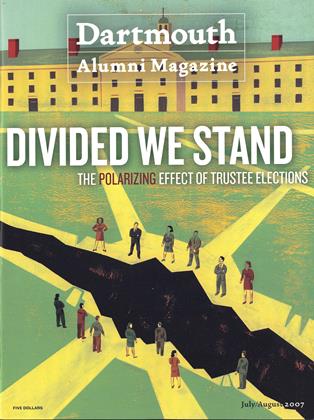ZIA DANIELL WIGDER directs an unusual chat group.
Two groups of women gathered around videoconference cameras last October—one in New York City and one in Gabes, Tunisia—to speak for an hour and start bridging the cultural divide. It was the first in a series of 12 biweekly discussions on topics ranging from the groups' perceptions of Americans and Arabs to comparisons of discrimination in their respective countries. "I felt that videoconferencing was this incredibly powerful technology that was completely underleveraged as a way to help people from different cultures communicate," says Wigder, founder of 12 Hours of Dialogue (www.12hours.org).
There were some animated discussions about feminism and women's legal rights, Wigder says, since Tunisia is still a very traditional society. Not surprisingly, however, the two groups shattered some stereotypes. "The Tunisian women view the United States based on what they see in TV shows like Sex in the City," says Wigder, who heads up the media practice at Jupiter Research in New York City. "But instead of Carrie Bradshaw, they got bleary-eyed grad students wearing sweatshirts. And the Americans were surprised at how outspoken the Tunisian women were and how much they controlled their own destiny."
Wigder spent two years getting the 12 Hours program off the ground, utilizing contacts she made while earning a master's at Tufts' Fletcher School and during years of international development work (Columbia University grad student Elizabeth Cullen '39 was a New York participant). The program will return next year to Tunisia, and Wigder is working to secure permission to launch in Jordan and Iran.
 View Full Issue
View Full Issue
More From This Issue
-
 Cover Story
Cover StoryDivided We Stand
July | August 2007 By Matthew Mosk ’92 -
 Feature
FeatureFrom the Halls of Dartmouth College to the Shores of Tripoli
July | August 2007 By DAVID T. NUTT ’44 AND ROBERT H. NUTT ’49 -
 Feature
FeatureHealthy Choice
July | August 2007 By LISA FURLONG -
 Feature
FeatureNotebook
July | August 2007 By JOHN SHERMAN, JOHN SHERMAN -
 Feature
FeatureAlumni News
July | August 2007 By Marrin Robinson '82, Marrin Robinson '82 -
 Article
ArticleNewsmakers
July | August 2007 By BONNIE BARBER
Bonnie Barber
-
 Feature
FeaturePiano Man
Sept/Oct 2004 By BONNIE BARBER -
 Article
ArticleNewsmakers
May/June 2006 By BONNIE BARBER -
 Cover Story
Cover StoryThe Women of ’76
Sept/Oct 2006 By BONNIE BARBER -
 Article
ArticleBalanced Biking
Jan/Feb 2007 By Bonnie Barber -
 Article
ArticleNewsmakers
Mar/Apr 2008 By BONNIE BARBER -
 Article
ArticleNewsmakers
May/June 2011 By BONNIE BARBER







